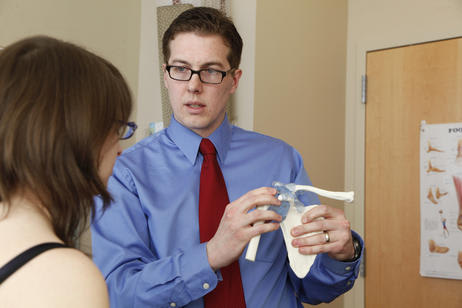Q&A: What’s the role of a primary care sports medicine physician?

You don’t have to be a high-level athlete to see a primary care sports medicine physician. In this Q&A, Dr. Joshua Purses explains how he helps his patients, from “weekend warriors” to the pros.
What is a primary care sports medicine physician?
Dr. Purses: Primary care sports medicine physicians are specially trained for total care of athletes and active individuals. For me, that means that after my residency in internal medicine and pediatrics, I did a fellowship in sports medicine. We are not orthopedic surgeons. Most primary care sports medicine doctors, including myself, work closely with orthopedic surgeons should such care be necessary. Approximately 90 percent of all sports injuries are non-surgical in nature.
What does a sports medicine physician treat?
Dr. Purses: There’s a long list of conditions that we can help with. They include:
- Acute injuries such as ankle sprains, joint injuries, dislocations and non-surgical fractures
- Overuse injuries including stress fractures, tendonitis and osteoarthritis
- Traumatic brain injuries or concussions
- Helping athletes with acute illnesses (mononucleosis, asthma)
- Nutrition
- Exercise prescriptions for people who want to become more active
- Injury prevention
- “Return to play” decisions for injured or ill athletes
- Pre-participation physical examinations
- Exercise promotion
Describe your work directly with athletes?
Dr. Purses: Many of us, including myself, work as team physicians for local sports teams. Currently, I am the team physician at Pacific Lutheran University and Wilson High School. I am an assistant team physician for the Tacoma Rainiers with my colleague, Dr. Greg Popich. As a team physician, we work closely with athletes, athletic trainers, parents and coaches to care for sick or injured athletes.
Do sports medicine physicians only see athletes?
Dr. Purses: No, a large portion of my patients are active adults and children, “weekend warriors,” “industrial athletes,” or even those who are not physically active but have orthopedic issues
Do you have a care philosophy?
Dr. Purses: I consider exercise to be medicine and am passionate about encouraging children and adults to maintain an active lifestyle. There is a role for exercise in treating conditions such as diabetes, hypertension, osteoporosis, osteoarthritis and even depression.
Why did you pick sports medicine?
Dr. Purses: I chose this field because I am an athlete and enjoy the mindset and drive of the athlete. I have played several sports, but settled on cross country and track in high school. I also participated at the college level. Some of the greatest lessons of my life have been learned through sports. I have great memories and friendships from my own experiences in athletics. Beyond the benefits to your health, lessons from sports often translate into real life as an adult.



